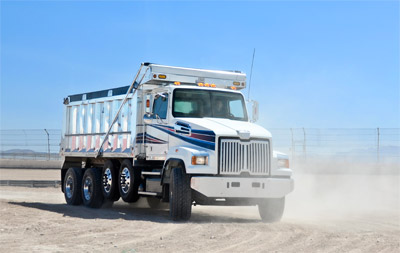 If you drive a dump truck, you understand that you must transport goods from one place to another. Sometimes, you will carry new items, such as sediment, coal or mulch to distributors. In other cases, you might carry scrap materials to disposal sites. Still, whatever your task, the dump truck poses risks to its surroundings. Operating this vehicle puts you at risks of accidents, and given the materials you haul, pollution risks. Why do these occur? What can you do to clean up messes?
If you drive a dump truck, you understand that you must transport goods from one place to another. Sometimes, you will carry new items, such as sediment, coal or mulch to distributors. In other cases, you might carry scrap materials to disposal sites. Still, whatever your task, the dump truck poses risks to its surroundings. Operating this vehicle puts you at risks of accidents, and given the materials you haul, pollution risks. Why do these occur? What can you do to clean up messes?
Often, your commercial auto liability insurance can help you out. Yet, you’ll have to see if the policy offers pollution liability coverage. In most cases, your policy will do so.
Driving a Dump Truck Commercially
Dump trucks serve important purposes in the movement of raw goods. However, you also must transport your goods safely and securely. If you fail to meet these goals, you could cost clients, yourself and your business a lot of money.
Commercial trucks are often harder to operate than your average automobile. Their weights, steering systems and operability often require their drivers to receive special licensing. Furthermore, should accidents occur, the damages might prove extremely costly. Trucks can do a lot more damage than your sedan, after all. They might even cause you to spill materials all over the roadways and the surrounding areas.
So, if you will operate a dump truck, you need the proper protection behind you to do so. In most cases, that means carrying commercial auto insurance. Most importantly, this will mean carrying liability insurance. Pollution liability coverage should fall among that coverage.
Why You Need Insurance
Insuring your dump truck is not just a recommendation for your convenience. It is the law.
Georgia requires all drivers, not only truckers, to carry coverage. Furthermore, commercial truckers also face a variety of other regulations outside of those levied on standard operators. You might face a rule to carry more insurance than other drivers. You also usually must maintain registration with the state.
Among the most-important coverage you’ll have to carry is liability insurance. It insures a driver’s risks that they pose to others. For example, if you cause an accident, then you might have to pay for the repairs.
Coverage will usually include Property damage liability (PDL) insurance. If you damage someone else’s property, then you might have to pay for their losses. For example, if you damage their vehicle, then you will likely be able to use this coverage.
However, these aren’t the only types of liability coverage you need. You cannot isolate damage to your truck and the other driver. You’ll have to think about the risks your trucks payload might cause harm to the local environment. Your coverage will need to include provisions to help you in such accidents.
Understanding Pollution Liability Insurance
Think about the structure of your dump truck. It will likely include an open top where loaders will deposit materials. It will also likely have a door on its rear to help you dump those items upon delivery.
However, these open areas will pose risks in and of themselves. Should accidents or other mishaps occur, the materials in your truck bed could come loose. They might spill. If they do, they might cause pollution of all shapes and sizes.
Let’s say that one rainy day, while delivering a load of coal to a client, your truck spins out of control on the slick road. The truck skids into the median and tips over. The coal spills into the median, the roadway and into a nearby farmer’s cow pond. This damage causes a closure in the road, and it also causes damage to the surrounding property.
In such situations, you and your business might have to pay for the damage and repairs. You might have to repay the transportation authorities for cleaning up the coal on the road. You might also have to repay the farmer whose pond you contaminated with spilled coal. In such cases, you’ll have to likely turn to your property damage liability insurance.
For help with these costs, make sure your policy will cover pollution liabilities. Often, pollution coverage will come within your PDL coverage on its own. On other policies, you will need to add the coverage into your policy. You must also ensure that liability coverage will altogether include enough monetary limits to pay for such damage.
Additional Pollution Help from Liability Coverage
Pollution from your dump truck might not come from truck bed contamination. It might come from the truck itself. Let’s say that after an accident, spilled gasoline or fluids contaminate the local area. In these cases, many pollution liability policies can help you pay for cleanups yet again.
Don’t hesitate to ask your dump truck’s insurer about the necessity of pollution insurance. Coverage is some of the most important that you will need when operating. Keep in mind, this is not the same coverage as cargo insurance. You will likely need that to insure you for the losses to property within the truck.